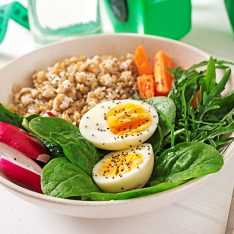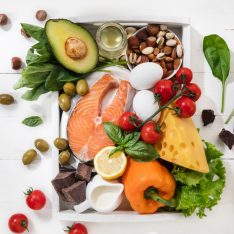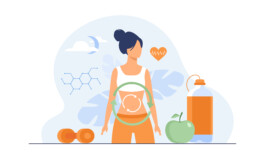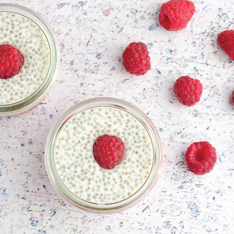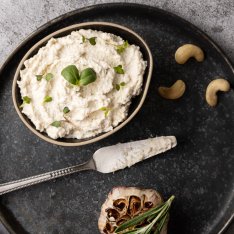Are Weight Loss Drugs Damaging Your Gut
ARE WEIGHT LOSS DRUGS CAUSING YOUR GUT ISSUES
6 / MARCH / 2024
SHEREE'S HEALTH DIARIES
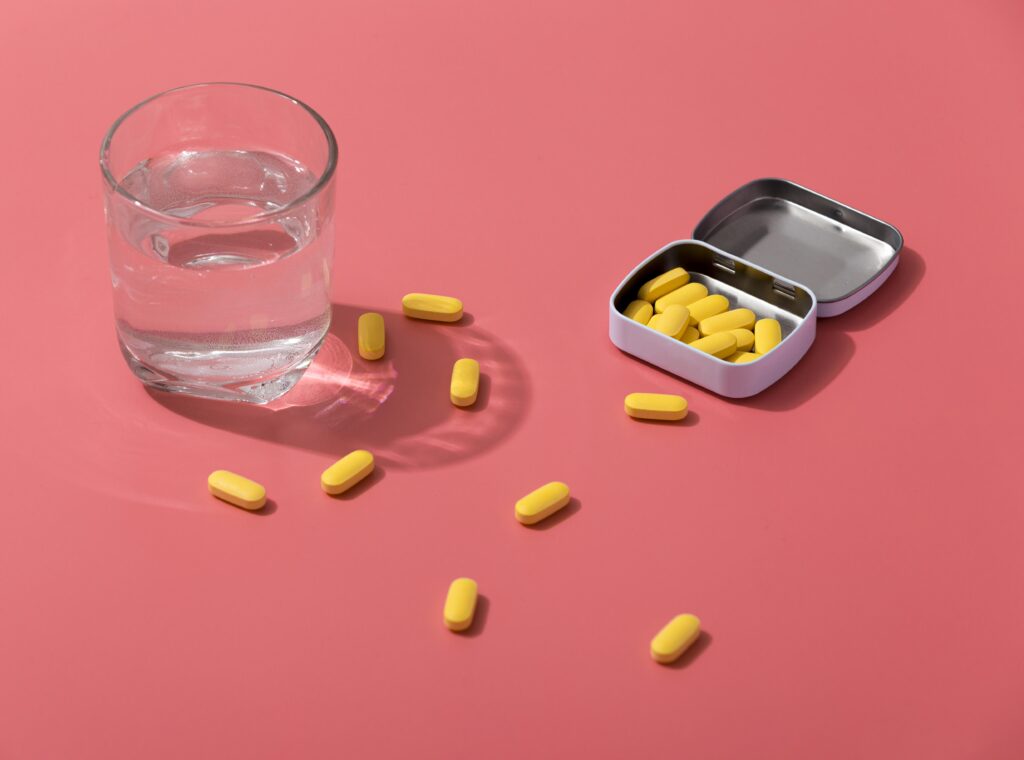
In the last 12 months we’ve seen a massive increase in weight loss medications, particularly from a peptide perspective - injectables that help regulate appetite and in many cases insulin sensitivity.
Among these are GLP-1 agonists—Ozempic, Liraglutide, Semaglutide (US names) These drugs are known for their impact on weight reduction, but concerns about their effects on gut health and potential promotion of bacterial overgrowth have raised questions.
WHAT THE STUDY SHOWS
A recent study delved into the risks associated with these medications. Researchers tracked 4,800 non-diabetic obese individuals using GLP-1 agonists and compared them to 650 obese individuals taking bupropion-naltrexone. Their one-year observation painted a troubling picture:
- The GLP-1 group faced a 9.1 times higher risk of pancreatitis, an inflammatory condition affecting the pancreas.
- The risk of bowel obstruction was 4.2 times higher in the same group.
- Additionally, the GLP-1 users experienced a 3.7 times higher risk of gastroparesis, a condition causing delayed stomach emptying.
Combining the risks of pancreatitis and bowel obstruction in the GLP-1 group suggested that approximately 125 individuals might potentially develop these conditions within two years of starting treatment.
The study revealed a strong association between these conditions and Small Intestinal Bacterial Overgrowth (SIBO), an ailment where bacteria thrive in the small intestine, leading to gastrointestinal issues.
Of concern is the potential rise in SIBO cases among those using GLP-1 agonists. The elevated risks observed for pancreatitis, bowel obstruction, and gastroparesis indicate a higher likelihood of SIBO development, hinting at an alarming trend among individuals seeking weight loss through GLP-1 agonists.
These medications function as glucagon-like peptide-1 receptor agonists, essentially working by stimulating insulin production to control blood sugar and regulate appetite. While their primary aim is weight loss, the significant side effects and potential influence on gut health raise a considerable concern.
FINAL THOUGHTS
The study's revelations highlight the necessity for additional research to deepen our understanding of how these medications might alter the gut microbiome and contribute to increased risks of gastrointestinal complications. As more findings emerge, a critical evaluation of the risks associated with specific weight loss treatments becomes imperative.
Weight loss drugs have positively impacted health management for many. However, the study suggests the importance of ensuring that weight loss pursuits do not inadvertently lead to unforeseen health complications. An in-depth understanding of the broader impacts of these medications, including their role in altering the gut microbiome, is crucial to ensuring their safety and efficacy.
As the healthcare landscape evolves, it's essential to comprehensively evaluate the implications and risks associated with weight loss medications, especially given their potential impact on gut health. The study's findings underline the significance of further research to understand the nuances and potential health consequences of these weight loss treatments.
Reference:
https://www.jwatch.org/na56649/2023/10/12/gastrointestinal-adverse-events-patients-taking-glp-1

SHEREE BEAUMONT
Holistic Nutritionist, Personal Trainer & Wellness Coach I empower women like you to transform their lives, understand their bodies and feel their best from the inside out!
POPULAR
Easing Period Pain With Zinc
EASING PERIOD PAIN: A STUDY ON THE EFFECTS OF ZINC SULFATE
21 / FEBRUARY / 2024
SHEREE'S HEALTH DIARIES
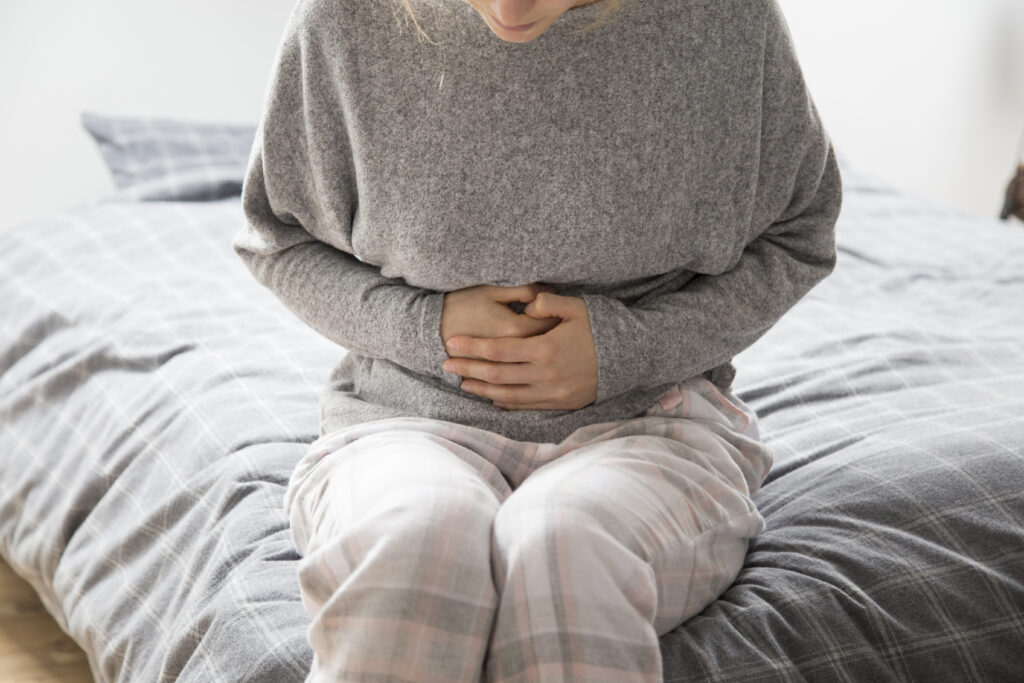
A recent study looked into how zinc sulfate affects high school students dealing with primary dysmenorrhea - that's just a fancy way of saying period pain or cramping that occurs without any other underlying condition. The study had 103 participants who were split into two groups: one group took 40mg of zinc sulfate, while the other group took a placebo for the first three days of their menstrual cycle for a total of three months!
Okay, let's cut to the chase. The group that took zinc saw a significant decrease in pain scores over the three months. But here's the kicker - the most noticeable changes happened during the third cycle. By the end of the study, the average pain scores in the zinc group were about half of what they were in the placebo group. Now, that's what I call progress!
HOW ZINC CAN HELP WITH PERIOD PAIN
Here's where I think it makes things interesting, because it takes about 100 days for the egg released during ovulation to mature - that's roughly three months. So, it makes sense that we saw the biggest improvements around that time. This is a huge reason why all my protocols with clients are for a minimum of three months to truly allow the intervention to work and solidify in the body.
Let's talk about period pain, or the fancy name for it - primary dysmenorrhea. Basically it’s caused by changes in prostaglandin levels, which lead to muscle contractions and, you guessed it, pain. These levels tend to spike when you regularly indulge on highly inflammatory foods like gluten, refined sugar, and those sneaky seed oils. To add insult to injury, low progesterone levels can also ramp up the pain - so if you’re overly stressed, or not ovulating effectively, you can bet your period pain is going to be more prominent.
Now, here's where zinc comes into play. The researchers believe that zinc works its magic by regulating prostaglandin enzymes, boosting antioxidant enzymes, and dialling down inflammation. And guess what? Previous studies have shown similar improvements with zinc sulfate, which just goes to show that we're onto something big here.
MY FINAL THOUGHTS
So, as your go-to wellness coach and expert, I'm here to share your Weekly Wellness Prescription:. I recommend popping 40 - 50mg of zinc for 3 - 4 days, starting the day before your period. Trust me, this little trick could be your ticket to a pain-free period (especially if you combine it with nutritional changes too).
References:
1. Yoon HS, Lee S, Kim JH, & Park SM. (2021). Association of beetroot juice supplementation with exercise capacity and performance: A systematic review and meta-analysis of randomized controlled trials. Nutrients, 13(3), 905. https://doi.org/10.3390/nu13030905
2. Domínguez R, Cuenca E, Maté-Muñoz JL, García-Fernández P, Serra-Paya N, Estevan MC, Herreros PV, & Garnacho-Castaño MV. (2014). Effects of beetroot juice supplementation on cardiorespiratory endurance in athletes. A systematic review. Nutrients, 6(2), 750–766. https://doi.org/10.3390/nu6020750
3. Wylie LJ, Kelly J, Bailey SJ, Blackwell JR, Skiba PF, Winyard PG, Jeukendrup AE, & Vanhatalo A. (2013). Beetroot juice and exercise: Pharmacodynamic and dose-response relationships. Journal of Applied Physiology, 115(3), 325–336. https://doi.org/10.1152/japplphysiol.00372.2013

SHEREE BEAUMONT
Holistic Nutritionist, Personal Trainer & Wellness Coach I empower women like you to transform their lives, understand their bodies and feel their best from the inside out!
POPULAR
Cold/Flu/Viral Infection Protocol
COLD/FLU/VIRAL INFECTION PROTOCOL
24 / JANUARY / 2024
SHEREE'S HEALTH DIARIES

After being hit with yet another bout of c*vid last week (but managing to bounce back within a couple of days + avoid long VID this time)
I thought I'd share with you my go-to cold/flu/viral protocol, these are my non-negotiable tools + supplements to get you bouncing back to health in no time!
MY RECOMMENDATIONS
First off… FASTING. Fasting has a significant impact on promoting immune system homeostasis, enhancing mitochondrial health, and increasing stem cell production. One of the ways fasting does this is by encouraging the removal of damaged mitochondria (mitophagy), misfolded and foreign proteins, and damaged cells (autophagy). Completing a 2 day fast upon onset, or intermittent fasting periodically can fast track your healing.
Next supplementation + sunshine:
- Zinc plays a vital role in supporting the immune system in its fight against viruses, colds, and flus. It functions as a cofactor for many enzymes involved in various aspects of immune function. Zinc is crucial for the development and function of immune cells, including white blood cells that are responsible for recognizing and attacking invaders like viruses.
Additionally, it helps regulate inflammation and acts as an antioxidant, protecting cells from damage. Zinc deficiency can impair the immune response, making the body more susceptible to infections. Ensuring an adequate intake of zinc through diet or supplements can contribute to a robust immune system, enhancing the body's ability to defend against illnesses caused by viruses and other pathogens.
Recommendation: 75 - 100 mg/day from onset until symptoms disappear, zinc gluconate/glycinate is a highly available form
- Vitamin C is a key player acting as an antioxidant, it shields immune cells from damage caused by free radicals. Vitamin C is vital for the production and function of white blood cells, which are essential for fighting infections. It also enhances the activity of certain immune system proteins and helps regulate inflammation.
Moreover, vitamin C promotes the integrity of the skin and mucous membranes, acting as a physical barrier against pathogens. A deficiency in vitamin C can weaken the immune response, making the body more susceptible to infections. By including sources of vitamin C in your diet, such as citrus fruits, berries, and leafy greens, you provide valuable support to your immune system, helping it stay strong and effective in warding off illnesses.
Recommendation: take 1000mg orally 2-3 x daily at onset of symptoms.
- Vitamin D plays acts as a modulator, influencing the activity and responsiveness of immune cells. Vitamin D receptors are present on various immune cells, and when activated, these receptors help regulate immune responses. Adequate levels of vitamin D contribute to the production of antimicrobial peptides, which are substances that can destroy a broad range of viruses and bacteria.
Moreover, vitamin D helps to maintain the integrity of the respiratory epithelial barrier, providing an additional defence against infections. A deficiency in vitamin D has been linked to an increased susceptibility to respiratory infections. Getting sufficient sunlight exposure and incorporating vitamin D-rich foods or supplements into your routine can optimise your vitamin D levels, supporting a robust immune system and reducing the risk of infections.
Recommended 4000 - 5000 IU daily upon onset of symptoms + 30 minutes of midday sunshine at least 3 x week
- Magnesium is involved in the activation of immune cells and helps regulate their function. Magnesium is essential for the production of energy within cells, and this energy is crucial for the proper functioning of immune cells during an immune response. Additionally, magnesium has anti-inflammatory properties, helping to balance the immune system's activity. It contributes to the maintenance of the body's overall health, which indirectly supports immune function.
High bioavailability forms such as magnesium glycinate and L-threonate are often best tolerated and can increase the magnesium in the red blood cells to support healing. Recommended ~300 - 400mg daily (always), and especially upon onset of symptoms.
MY FINAL THOUGHTS
There's a more detailed version with a few extra supplements, recommendations + medications as a full protocol going inside of my CWC membership next month.
If you want to have access to my most effective protocols and resources, you're going to want to be in there! Click here for more info!
*Please note this is not to replace medical advice

SHEREE BEAUMONT
Holistic Nutritionist, Personal Trainer & Wellness Coach I empower women like you to transform their lives, understand their bodies and feel their best from the inside out!
POPULAR
5 Reasons You're Bloated
5 REASONS YOU'RE BLOATED (that has NOTHING to do with the food you’re eating)
8 / NOVEMBER / 2023
SHEREE'S HEALTH DIARIES

Do you often find yourself feeling bloated, regardless of what foods you've eaten? If so, you're not alone. Bloating can be frustrating and uncomfortable, but it's essential to realise that there's often more to it than just certain foods triggering your discomfort.
The good news is that many of my clients discover relief after addressing the root causes of their bloating. Let's dive deeper into why you might be experiencing bloating…
CAUSES OF BLOATING (other than food)
1. Stress: stress plays a more significant role in our digestive health than we might think. When we're under high stress, our body shifts its focus away from digestion and into "fight or flight" mode. This response is meant to prepare us for danger, not for digesting a meal. As a result, digestion slows down significantly, leading to gas and bloating.
2. SIBO (Small Intestinal Bacterial Overgrowth): SIBO is a condition where there's an overabundance of bacteria in the small intestine, a place where there usually shouldn't be many bacteria. These bacteria ferment food and create gas. This overproduction of gas can leave you feeling bloated and uncomfortable.
3. Not Chewing Your Food: digestion begins in the mouth. The process of breaking down food starts when we chew, mixing it with saliva. This not only makes it easier for the stomach to digest but also allows for better absorption of nutrients. When we don't chew our food thoroughly, larger food particles enter the stomach. These larger particles are more challenging to digest, resulting in gas buildup and bloating.
4. Low Stomach Acid: adequate stomach acid is essential for breaking down the food we eat. It's the first step in the digestive process. When stomach acid is low, it's like trying to start a car with a nearly empty gas tank. The body isn't fully prepared for the food entering the stomach, which can slow down digestion and leave undigested food sitting in the digestive tract for hours. This undigested food contributes to bloating.
5. Dehydration: proper hydration is essential for healthy digestion. When there's an imbalance of fluids and electrolytes, it can lead to constipation. Constipation means that food moves more slowly through the digestive tract, leading to that bloated feeling.
FINAL THOUGHTS
If you're tired of dealing with bloating and want to address the root causes, we're here to help. We understand that it's more than just about what you eat; it's about how your body processes it.
Comment 'BLOAT,' and let's work together to make relief from bloating a reality. Say goodbye to that uncomfortable, frustrating bloated feeling and embrace a healthier, happier digestive system.

SHEREE BEAUMONT
Holistic Nutritionist, Personal Trainer & Wellness Coach I empower women like you to transform their lives, understand their bodies and feel their best from the inside out!
POPULAR
How I Lost 10lbs With Ease
HOW I LOST 10 LBS WITH EASE AND KEPT IT OFF FOR GOOD
11 / OCTOBER / 2023
SHEREE'S HEALTH DIARIES

I am the leanest, lightest, happiest, and healthiest I have been in almost a decade…
And it isn't from being on a diet or doing a protocol or a whole host of supplements that I've been taking. It’s from mastering the basics
HOW I MASTERED THE BASICS
- Regulating my nervous system
I stopped letting cortisol have a chokehold on my life, and it shows. Your stress levels directly dictate if your body can burn fat, or if it’s stuck in fight-or-flight, burning glucose only. - Eating real foods 80% of the time
I fundamentally believe food is medicine and we can use it to heal and change our bodies for the better. Of course, everything in moderation, which is why I aim for at least 80% whole foods. - Finding my community
Having been surrounded by an incredibly supportive and loving community, I’ve had the chance to make connections to fulfil me and help me on my journey. - Drinking 3+ litres of water a day
This might seem like a lot (I know everyone tells you to stop at 2 litres), but hydration is the single most important thing for your body to function. You need to keep yourself hydrated to shed excess weight, too. - Apple cider vinegar before meals
This is incredible for avoiding a blood sugar spike (which would normally signal to your body to store more fat over time), as well as reducing blood sugar dips, stabilising your appetite, too. - Moving my body in ways I love
I’ve always loved training in the gym, BUT there are also other ways in which I move my body daily. I absolutely love walking or doing a soul cycle class. It’s all about balance and finding what works for you. - Listening to my body, always
I trust in what my body asks for, whether that’s an extra rest day, certain food, practising gratitude and self-care. Most importantly, I give my body the respect it deserves and never talk down on myself! - Spending time in nature
Absolutely nothing beats getting some sun and fresh air, grounding yourself in nature, and getting some movement in at the same time, too. It’s the most fundamental way to heal, recover, and reduce stress. - Starting my day with movement
Okay, I talk about how much I love working out but seriously, my favourite thing to do is start my day with any type of movement. This kick starts your metabolism, supports blood sugar levels, and boosts your mood! - Prioritising NEAT every single day
NEAT stands for non-exercise activity thermogenesis, and refers to ways in which we expend energy aside from exercise-related activity, for example things like walking, cooking, or gardening. - Practising gratitude daily
And finally... maybe the most important thing for me, and I couldn’t have shed those 10 lbs without this. Gratitude practices help me stay centred and in tune with myself. Plus, this helps reduce stress (cortisol) levels, which as I mentioned is one of the main things you need to prioritise to burn body fat.

SHEREE BEAUMONT
Holistic Nutritionist, Personal Trainer & Wellness Coach I empower women like you to transform their lives, understand their bodies and feel their best from the inside out!
POPULAR
TOP 10 TAKEAWAYS FROM BRENDON BURCHARD LIVE 4 / OCTOBER / 2023 SHEREE’S HEALTH DIARIES Coaching Summit Austin, Texas Sept 2023 will be forever imprinted in my heart, mind and soul. To say it was life changing would be an understatement 🙌🏽 The people I had the blessing of meeting The connection, joy and pure love that was in the roomThe wisdom, knowledge, growth that was shared Was something rather remarkable On the 14th – 16th of September myself and 1500 other incredible humans gathered together at the JW Marriott in Austin, Texas to undertake the Coaching Summit led by …
WHY I’M DRINKING COFFEE AGAIN… 27 / SEPTEMBER / 2023 SHEREE’S HEALTH DIARIES After a 6+ year hiatus 😅 If you’ve followed me for any length of time, you’ll know it’s always an HBL (hormone balancing latte) in the morning for me, no caffeine What you may not be aware of is WHY Back when I was studying nutrition at University I was consuming caffeine like it was going out of fashion Wake up – black coffee before opening the gym Drive to uni – energy drink During lectures – energy drink Driving home – energy drink to stimulate me …
BREAKFAST BOWL RECIPE 23 / AUGUST / 2023 SHEREE’S HEALTH DIARIES GF | DF | RSF | Paleo Prep Time: 10 minutes Cook Time: 15 minutesTotal Time: 25 minutesYields: 1 serving This simple and easy recipe is perfect for breakfast and also ensures you get your protein hit to start the day right! INGREDIENTS – 2 eggs – ½ cup cooked quinoa– 3 strips of bacon (optional – if you don’t have it, ensure you increase to 3 eggs)– ⅓ avocado – 2 stalks of kale stem removed– 1 tbsp. sunflower seeds– 1 tsp. olive oil– 3 spears of asparagus, …
Learnings From Brendon Burchard Himself
TOP 10 TAKEAWAYS FROM BRENDON BURCHARD LIVE
4 / OCTOBER / 2023
SHEREE'S HEALTH DIARIES

Coaching Summit Austin, Texas Sept 2023 will be forever imprinted in my heart, mind and soul. To say it was life changing would be an understatement 🙌🏽
The people I had the blessing of meeting
The connection, joy and pure love that was in the room
The wisdom, knowledge, growth that was shared
Was something rather remarkable
On the 14th - 16th of September myself and 1500 other incredible humans gathered together at the JW Marriott in Austin, Texas to undertake the Coaching Summit led by expert coach and thought leader Brendon Burchard. Ten hour days, 50+ pages of notes, 100’s of connections made and about 40,000 steps later from all the dance parties up the front I was in my ELEMENT!
Whilst I am a qualified holistic nutritionist, my other deep love is personal development and growth. Which is why I integrate these two worlds into the work I do.
But what is a coach? What is coaching? Burchard had us define this multiple times over the course of the conference, and through my own personal experience, listening to each other and Burchard’s definition I concluded the following definitions that feel most aligned with all of the above:
What is coaching?
A guided influential process, facilitating another soul to take the next most powerful step in their life towards their goal or ambition, that enhances their self-awareness, decision making, improves performance and leads to living better
What is a coach?
A coach is an expert in their field who holds a safe space for someone to have a transformative experience on some levels that will positively impact their life and support them in reaching their ambitions, challenging and holding them to their highest level of execution.
MY TAKEAWAYS
Over the course of the 3 days, I had so many breakthroughs, a-ha moments, laughs and felt the most immense joy! Something really powerful in me shifted and I am excited for that to unfold and integrate in the weeks and months to come, however there were some incredible lessons that I know you will find so valuable so I thought I’d share them with you below:
- You are incomparable
There is only one of you, and there only ever will be, comparison is the thief of joy, own your uniqueness and know that you already hold the magic inside of you, the most authentic expression of yourself is needed in this world. - The story you are saying is not the language you need for your next level
Watch your thoughts, you are not your mind, the stories you tell yourself daily is what becomes your reality. If those thoughts aren’t aligned, the way you speak to yourself is not for your highest good, then it’s time to shift your language to elevate to your next level. - The time to have the map is before you enter the woods
Set your intentions, goals and ambitions, or life will set them for you. Start where with the end in mind, it is always easier to work backwards from the bigger picture than to try navigate and make decisions when you are stressed and lost. - Joy is the superpower - the power plant doesn’t have the energy, it creates it
You get to bring the energy, the emotion to each day, and just like a power plant it is your job to create the energy of joy. That is our superpower, to be able to operate from this space and to be able to truly share our magic with the world. This is the frequency of the highest vibration, opportunities and love. How can you be in joy more each day? - THINK BEYOND; vision beyond your circumstances
We can get so trapped in what is right in front of us, so consumed by the weeds in our garden of life that we miss the beautiful opportunities flowering around us. When you come back to your vision, your true north, you see you are so much more than your circumstances, so when you feel stuck or helpless, THINK BEYOND. - When they doubt, you demonstrate
To sound overly generic for a second… ‘Haters gonna hate’ haha. But in all honesty, don’t let others' judgement, doubts or fears be projected onto you. It can be tough when you have big goals and dreams to always have support from those around you (or online). You have to remember, you have a responsibility to yourself and this world to carry out your mission and it can be triggering for others to be able to see you in your bigness. This doesn’t mean you are not worthy or capable. And if they doubt, don’t get defensive, DEMONSTRATE. In time they will see, remember, actions speak louder than words (and soon enough they will be eating theirs haha). - Own the decision fully
This one hit me like a slap across the face. It’s amazing how when you’re someone who is a recovering people pleaser, how hard it can be to truly own a decision out of fear of hurting people, especially if it is a big decision. However, when you make a decision, embodying it FULLY and taking bold action that supports it is the most powerful way forward. - Ask yourself powerful questions:
- Am I operating from a place of being built up or beat down?
- Am I in reaction or intention?
- Am I living in fear or faith? These questions were just a few of the potent ones Burchard shared with us. I encourage you to keep these top of mind to deepen your self-awareness and growth in life.The first one to me, really asks if we are operating out of victimhood, or choosing to see the lesson life is offering us in a moment of hardship (and although it can be hard to see it at the time, there is a gift there) we have a choice in our viewpoint.
The second one to me is being clear on how you respond and what place you take action from. Are you being intentional in how you communicate and behave even when things aren’t lining up for you, or are you operating from a place of reactivity, getting defensive and avoiding responsibility.
The third one to me is coming back to a lesson I have felt deeply this year… a lesson of trusting life. When we choose to live in faith over fear, we trust that life is always working out for us, versus happening to us. What are you choosing at each moment?
- The difference between ordinary and extraordinary is just that extra 2%, and after that extra mile there’s no traffic (Paula Abdul)
So many of us (myself included), have a tendency to stop at ‘good’ when greatness is just an extra mile away. One of my intentions I’m carrying with me after this summit is to yes, take messy action (rather than inaction due to perfectionism), but also to continue to strive for that EXTRAORDINARY. It’s not that much more of a jump, but the view is so exquisite on both the journey and destination. - REMEMBER: (my final words + thoughts)
You get to be everything you want in this world 🤩
You hold the power, the magic, the responsibility within ✨
You get to LIVE. LOVE. MATTER. ❤️
To BRING THE JOY 🥹 into every single moment
FINAL THOUGHTS
We also had the pleasure of celebrating @brendonburchard ‘s 100TH 4 DAY EVENT! 💯💯💯 This is quite an achievement. Burchard has been in the coaching industry (and paving the way for the majority of it), for 20 years (that’s two decades). So to be at such a monumental event of his was amazing.
I’ve admired this man’s work for years, and to finally be in the same room, in person, from the other side of the world was unreal 🥹😭😍 I can also say wholeheartedly that he truly lives and breaths this work, I could feel the immense gratitude and joy for him simply being able to be present. I have so much admiration for his dedication to this craft and his capacity to give, continue to grow and always share his learnings along the way. There is room for all of us and sharing wisdom is the fastest way to elevate the conscious collective (IMO)
I am still grinning from ear to ear reflecting on the magic that happens when you get a bunch of personal development weirdos, coaches and conscious minds together
I’m beyond INSPIRED to create
And even more INSPIRED to step into not only the next level of my own growth
But the EVOLUTION of my service to this beautiful place we call home
Watch this space! Thank you 🙏🏽 and CONGRATULATIONS to the legend Mr @brendonburchard again!
This coach is ready to change the game in wellness + life!
Much love, and remember to always, always chase your dreams… you have no idea what is out there waiting for you if you just take that first step.
What was your main takeaway from this? Let me know below 👇🏽

SHEREE BEAUMONT
Holistic Nutritionist, Personal Trainer & Wellness Coach I empower women like you to transform their lives, understand their bodies and feel their best from the inside out!
POPULAR
TOP 10 TAKEAWAYS FROM BRENDON BURCHARD LIVE 4 / OCTOBER / 2023 SHEREE’S HEALTH DIARIES I’m a holistic wellness coach; clinical nutritionist, personal trainer and hormone expert. I empower beautiful humans like yourself to find balance, health and happiness in all aspects of your life. Being diagnosed as a Coeliac at the age of 22 months, all I have ever known is being on a diet and constant food restriction. For years I battled with fad diets, calorie counting, hormonal imbalances, self-esteem issues and poor gut health. However, it was through my own journey that I healed my relationship with …
WHY I’M DRINKING COFFEE AGAIN… 27 / SEPTEMBER / 2023 SHEREE’S HEALTH DIARIES After a 6+ year hiatus 😅 If you’ve followed me for any length of time, you’ll know it’s always an HBL (hormone balancing latte) in the morning for me, no caffeine What you may not be aware of is WHY Back when I was studying nutrition at University I was consuming caffeine like it was going out of fashion Wake up – black coffee before opening the gym Drive to uni – energy drink During lectures – energy drink Driving home – energy drink to stimulate me …
BREAKFAST BOWL RECIPE 23 / AUGUST / 2023 SHEREE’S HEALTH DIARIES GF | DF | RSF | Paleo Prep Time: 10 minutes Cook Time: 15 minutesTotal Time: 25 minutesYields: 1 serving This simple and easy recipe is perfect for breakfast and also ensures you get your protein hit to start the day right! INGREDIENTS – 2 eggs – ½ cup cooked quinoa– 3 strips of bacon (optional – if you don’t have it, ensure you increase to 3 eggs)– ⅓ avocado – 2 stalks of kale stem removed– 1 tbsp. sunflower seeds– 1 tsp. olive oil– 3 spears of asparagus, …
7 Daily Things To Live Your Best Life
7 THINGS I DO DAILY TO LIVE MY BEST LIFE
16 / AUGUST / 2023
SHEREE'S HEALTH DIARIES

Habits that keep me thriving in all areas of my health, business and life
Things I do EVERY single day to help maintain a healthy lifestyle, physically AND mentally, without being restrictive ❣️
I recommend these things to ALL of my clients.
MY TOP HEALTHY HABITS
1. Regulating my nervous system (aka controlling cortisol levels 📉)
STRESS impacts everything. Managing your stress levels is SO important for everything from hormonal balance to gut health, spiritual well-being and digestive health. So I make feeling safe in my body my number one priority.
2. Workouts tailored to my body and cycle 🏋🏼♀️
This is essential for regaining your energy. Understand that when you are on your period, your energy levels can be low compared to when you’re ovulating. This means your training and output will look completely different - and that’s fine!
Truth is, if you push yourself too hard when you’re menstruating, you’re just robbing your body of that tiny bit of energy you have. Doing this every month becomes exhausting!
3. Swapping coffee for HBL ☕️
I’m a firm believer in ditching (or at least lowering) the CAFFEINE. But it’s hard to just cut it out completely, I get that! My Hormone Balancing Latte contains no coffee, and a super small amount of caffeine from the cacao so it’s the perfect way to start your day and replace your regular morning drink with something to actually support your hormones.
4. Spending 30+ mins reading every day 📖
Your brain needs just as much nourishment as your mind, and when it's been said we consume over 42GB of information a day (that's 42 trucks stacked top to bottom with reams of paper), you'd better make sure it's real food, not junk food.
5. Not restricting myself (food & drinks) 🍕
If you’re anything like me, you know that food is an important part of life AND you get that you can’t just cut out all of your fave foods forever! That’s why I’m not restrictive with what I eat and drink - and I was still able to balance my hormones, lose weight, and boost my metabolism. Trust me, you can, too ✨
6. Getting out in the sunshine + nature ☀️
Get fresh air and sun exposure! Even if it’s cloudy. This helps your circadian rhythm, sleep quality, vitamin D production, and mood. Bonus points if you get some grounding in, walking barefoot on Mother Nature recharges our human battery.
7. Sauna's 3 x week for my lymphatic system + mental health 🧖🏼♀️
We don't sweat much anymore, and this healthy stress on the body enables you to cleanse out the toxins you could be holding onto (including things like too much estrogen), I time it right after my workouts to optimise lymphatic drainage, and support the release of those endorphins for my mental health
If you have health problems or symptoms that stem from or are aggravated by stress (like IBS) this will help you immensely.
DO YOU DO ANY OF THESE THINGS, TOO?
Let me know which ones in the comments 💖
Yours in Health & Happiness,
Sheree xo

SHEREE BEAUMONT
Holistic Nutritionist, Personal Trainer & Wellness Coach I empower women like you to transform their lives, understand their bodies and feel their best from the inside out!
POPULAR
7 THINGS I DO DAILY TO LIVE MY BEST LIFE 16 / AUGUST / 2023 SHEREE’S HEALTH DIARIES Habits that …
WHAT WORKOUTS DO TO YOUR HORMONES 🏋️♀️ 09 / AUGUST / 2023 SHEREE’S HEALTH DIARIES WHAT WORKOUTS DO TO YOUR …
THE CHOLESTEROL MYTH 02 / AUGUST / 2023 SHEREE’S HEALTH DIARIES Why you should stop swapping your butter for margarine… …
The Science Behind Gut Healing And Hormones
THE SCIENCE BEHIND GUT HEALING & HORMONES
12 / JULY / 2023
SHEREE'S HEALTH DIARIES
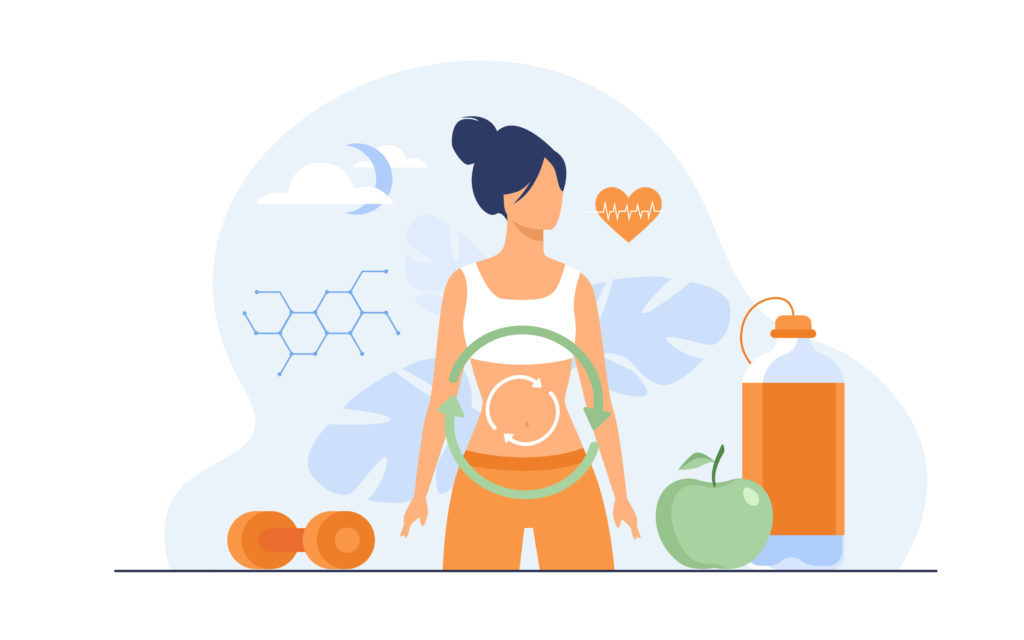
Did you know that the health of your gut plays a crucial role in maintaining hormonal balance and boosting your energy levels? Let's dive into the fascinating science behind this powerful connection.
THE 5 CONNECTIONS EXPLAINED
1️⃣ Gut Microbiota: The trillions of bacteria residing in your gut, known as the microbiota, have a profound impact on hormone production and metabolism. A balanced and diverse gut microbiota is essential for optimal hormonal function.
2️⃣ Inflammation and Hormones: Poor gut health can lead to chronic inflammation, which disrupts hormone production and signalling. By healing the gut and reducing inflammation, you can restore hormonal balance and reclaim your energy.
3️⃣ Nutrient Absorption: A healthy gut allows for proper absorption of essential nutrients, including those needed for hormone synthesis and regulation. Nourishing your gut with nutrient-dense foods ensures your hormones have the building blocks they need.
4️⃣ The Gut-Brain Axis: The gut and brain communicate through a bidirectional pathway called the gut-brain axis. A balanced gut positively influences brain health, mood, and stress response, all of which impact hormonal balance and energy levels.
5️⃣ Gut-Immune System Connection: The gut houses a significant portion of your immune system. A strong immune system supports overall health, including proper hormonal function and sustained energy throughout the day.
FINAL THOUGHTS
Understanding the intricate relationship between gut health, hormones, and energy empowers you to take proactive steps towards healing your gut and revitalising your well-being.
Remember, nurturing your gut is a powerful investment in your hormonal harmony and limitless energy! 🌱💫

SHEREE BEAUMONT
Holistic Nutritionist, Personal Trainer & Wellness Coach I empower women like you to transform their lives, understand their bodies and feel their best from the inside out!
POPULAR
THE SCIENCE BEHIND GUT HEALING & HORMONES 12 / JULY / 2023 SHEREE’S HEALTH DIARIES Did you know that the …
A LETTER FROM MY HIGHER SELF 5 / JULY / 2023 SHEREE’S HEALTH DIARIES Dear Beautiful Soul, You’re not going …
SALTED CARAMEL & RASPBERRY CHIA PUDDING RECIPE 28 / JUNE / 2023 SHEREE’S HEALTH DIARIES Prep Time: 5 mins Cook …
A Letter From My Higher Self
A LETTER FROM MY HIGHER SELF
5 / JULY / 2023
SHEREE'S HEALTH DIARIES

Dear Beautiful Soul,
You’re not going to believe where you are right now. The smile on your face cannot be shaken and the love in your heart will never fade. You are sharing your light, you are sharing your gifts with the world and you are expanding and exploding with joy.
Your soul aligned mission on this earth that has been divinely guided is being lived in right here, right now.
I know where you are in this moment is tough, I know that it feels like the world is crumbling around you and at times like it is all too much. I know that this is not where or how you pictured your life at this point and I want you to know that it is okay to grieve that.
I also want you to know that it is all coming. This is the initiation. A chance for you to reset. To realign your life to your higher calling, to your deeper purpose and also a chance for you to be the fullest, most beautiful expression of yourself.
It is by stepping into this version of yourself that you will attract everything that you’ve ever wanted and more, and let me tell you… it is SO MUCH MORE than you could’ve ever dreamed.
I want to take a moment to see you, to recognise the strength you have had, the vulnerability you have shown, the beauty you have been amongst the chaos and your willingness to continue the fight.
I also want you to take a moment to acknowledge how far you have come and how much you have accomplished, your younger self would be so proud of you if she could see the woman you have become now. Honour that.
You are beautiful, loving, kind and beyond words. This life may not be kind at times, but remember… No one else in this world can do what you do, the way you do it, and that my darling is your superpower.
It is my hope for you that you will trust the path you are on right now, and know that God/Universe/Source has your back every step of the way.
I wish you could see yourself the way the world sees you, you light up every room you are in, your heart transcends the time, space and fear and allows others to feel safe and seen, your ability to simply be is enough. You are enough, exactly as you are.
I love you. I love you. I love you. Thank you for being you, thank you for existing and remember to never stop shining your beautiful light, the world needs you. I need you. You are enough.
And so it is.
With love,
Your Higher Self

SHEREE BEAUMONT
Holistic Nutritionist, Personal Trainer & Wellness Coach I empower women like you to transform their lives, understand their bodies and feel their best from the inside out!
POPULAR
SALTED CARAMEL & RASPBERRY CHIA PUDDING RECIPE 28 / JUNE / 2023 SHEREE’S HEALTH DIARIES Prep Time: 5 mins Cook …
THIS IS WHAT’S DRAINING YOUR ENERGY 21 / JUNE / 2023 SHEREE’S HEALTH DIARIES More sleep isn’t the answer to …
CASHEW CREAM CHEESE RECIPE 14 / JUNE / 2023 SHEREE’S HEALTH DIARIES Prep Time: 4 hoursCook Time: 2 minutesTotal Time: …
5 Hormones Affecting Your Ability To Lose Weight
5 HORMONES AFFECTING YOUR ABILITY TO LOSE WEIGHT
7 / JUNE / 2023
SHEREE'S HEALTH DIARIES

Hormone health plays a crucial role in achieving and maintaining a healthy weight.
When it comes to weight loss, we often aren’t looking deep enough, we blame it on the food we are eating and the lack of movement and simply think more is more.
Well that’s not the case, there are so many factors that impact your ability to lose weight, and hormones are one of them. Here’s how…
HORMONES THAT AFFECT YOUR ABILITY TO LOSE WEIGHT
1. Insulin:
Insulin is a hormone responsible for regulating blood sugar levels. When insulin levels are imbalanced, such as in insulin resistance, weight gain becomes more likely. Balancing insulin through dietary changes and lifestyle modifications can support weight loss efforts.
2. Leptin:
Leptin, known as the satiety hormone, signals to your brain when you're full. However, hormonal imbalances can lead to leptin resistance, causing a disruption in appetite regulation and potentially leading to overeating. Restoring leptin sensitivity through proper nutrition and lifestyle choices can aid in weight management.
3. Cortisol:
Cortisol, the stress hormone, plays a role in metabolism and fat storage. Chronic stress can lead to elevated cortisol levels, promoting weight gain, particularly around the abdominal area. Managing stress through relaxation techniques, exercise, and self-care practices can help balance cortisol and support weight loss.
4. Thyroid Hormones:
Thyroid hormones, such as T3 and T4, regulate metabolism. When thyroid function is impaired, it can result in a slower metabolism and difficulty losing weight. Addressing underlying thyroid issues through proper medical guidance can support weight loss efforts.
5. Estrogen and Progesterone:
Hormonal imbalances, particularly in estrogen and progesterone, can impact weight regulation, water retention, and fat distribution. Restoring hormonal balance through lifestyle modifications, targeted nutrition, and, if necessary, hormonal therapies can aid in achieving weight loss goals.
HOW TO UNF*CK YOUR HORMONES
Comment 'HORMONES' below for access to my free masterclass on how to eat to balance your hormones!

SHEREE BEAUMONT
Holistic Nutritionist, Personal Trainer & Wellness Coach I empower women like you to transform their lives, understand their bodies and feel their best from the inside out!
POPULAR
5 HORMONES AFFECTING YOUR ABILITY TO LOSE WEIGHT 7 / JUNE / 2023 SHEREE’S HEALTH DIARIES Hormone health plays a …
MANGO LASSI GUMMIES RECIPE 31 / MAY / 2023 SHEREE’S HEALTH DIARIES Prep Time: 2 minutesCook Time: 8 minutesTotal Time: …
5 SIMPLE STEPS TO START BALANCING YOUR HORMONES TODAY 24 / MAY / 2023 SHEREE’S HEALTH DIARIES Here are five …








